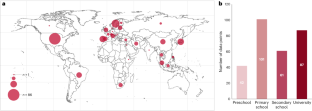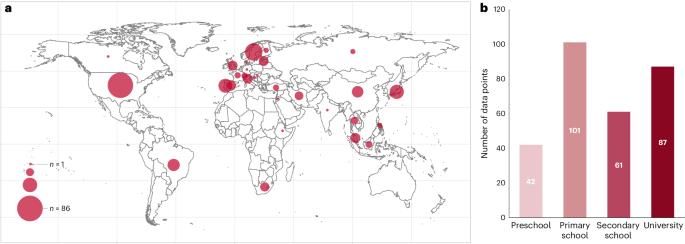Global school plate waste estimates highlight the need for building a sustainable food education system
IF 21.9
Q1 FOOD SCIENCE & TECHNOLOGY
引用次数: 0
Abstract
Food waste reduction is essential for supporting the sustainability of food systems. Wasteful behaviours are difficult to change after they have been formed, highlighting the importance of early interventions. Here we present an assessment of school plate food waste from 29 countries, and examine the environmental implications, causes, and interventions. School plate waste ranged from 4% to 46% per capita per meal and was positively correlated with country income levels. On a global scale, this waste embodies ∼150 Mha of cropland and ∼770 MtCO2e of greenhouse gas emissions; hence, reducing school plate food waste offers potentially large environmental gains. We propose a comprehensive, multistakeholder framework centred around sustainable food education that cultivates food systems knowledge and skills, and an appreciation for nature and food labour to reduce the psychological distance between youth and their food waste. To effectively implement the framework requires the support and engagement of families, communities and the broader society beyond the confines of schools. A dataset including 29 countries and life-cycle assessment highlights the environmental impact of school plate food waste. A sustainable food education framework is presented to support early intervention and wasteful behavioural changes.


全球学校餐盘浪费估计数凸显建立可持续食品教育系统的必要性
减少食物浪费对于支持粮食系统的可持续性至关重要。浪费行为在形成后很难改变,这就凸显了早期干预的重要性。在此,我们对 29 个国家的学校餐盘食物浪费情况进行了评估,并研究了其对环境的影响、原因和干预措施。学校餐盘食物的人均浪费率从每餐 4% 到 46% 不等,并且与各国的收入水平呈正相关。在全球范围内,这种浪费造成了 1.5 亿公顷的耕地和 7.7 亿吨 CO2e 的温室气体排放;因此,减少学校餐盘食物浪费有可能带来巨大的环境收益。我们提出了一个以可持续食品教育为中心的多方利益相关者综合框架,培养食品系统知识和技能,以及对自然和食品劳动的欣赏,从而缩短青少年与食物浪费之间的心理距离。要有效实施该框架,需要学校以外的家庭、社区和广大社会的支持和参与。
本文章由计算机程序翻译,如有差异,请以英文原文为准。
求助全文
约1分钟内获得全文
求助全文

 求助内容:
求助内容: 应助结果提醒方式:
应助结果提醒方式:


